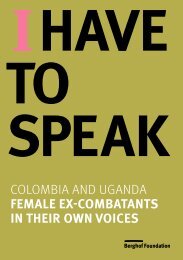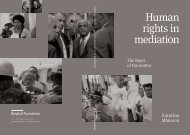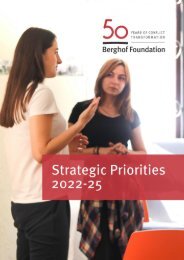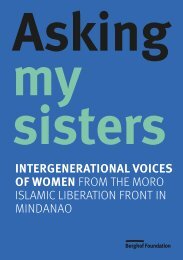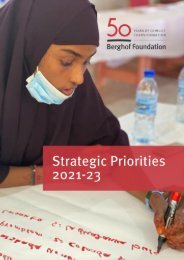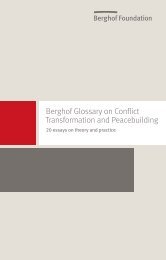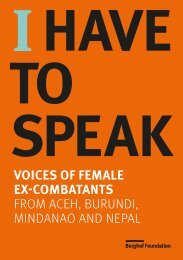Berghof Foundation: 50 years of conflict transformation
This book provides an overview of the Berghof Foundation’s work and impact over the past 50 years and sheds light on the challenges ahead of peacebuilding.
This book provides an overview of the Berghof Foundation’s work and impact over the past 50 years and sheds light on the challenges ahead of peacebuilding.
Create successful ePaper yourself
Turn your PDF publications into a flip-book with our unique Google optimized e-Paper software.
A timeline <strong>of</strong> the organisation<br />
1971 1970s 1980s 1993<br />
The <strong>Bergh<strong>of</strong></strong><br />
<strong>Foundation</strong><br />
begins its work<br />
The <strong>Bergh<strong>of</strong></strong><br />
<strong>Foundation</strong> for<br />
Conflict Studies is<br />
founded by Georg<br />
Zundel in Munich,<br />
(West) Germany<br />
as a private limited<br />
company with<br />
charitable taxexempt<br />
status<br />
under German law.<br />
<strong>Bergh<strong>of</strong></strong> <strong>Foundation</strong><br />
supports array <strong>of</strong> peace<br />
initiatives<br />
During its first decade,<br />
the <strong>Bergh<strong>of</strong></strong> <strong>Foundation</strong><br />
made grants to support<br />
a range <strong>of</strong> activities and<br />
groups focused on peace<br />
research and education.<br />
This includes seed<br />
funding for nascent peace<br />
projects and international<br />
exchanges. In 1977, the<br />
<strong>Bergh<strong>of</strong></strong> <strong>Foundation</strong><br />
begins its support for<br />
the Association (later<br />
Institute) for Peace<br />
Education Tübingen<br />
(p. 34).<br />
Cold War tensions and<br />
growing peace movement<br />
deepen <strong>Bergh<strong>of</strong></strong>’s<br />
engagement<br />
Tensions increase as<br />
détente policies are<br />
replaced by a new<br />
arms race between the<br />
Cold War powers, with<br />
tactical nuclear weapons<br />
deployed either side<br />
<strong>of</strong> the internal German<br />
border. The <strong>Bergh<strong>of</strong></strong><br />
foundation establishes a<br />
research facility in Berlin,<br />
the Research Institute <strong>of</strong><br />
the <strong>Bergh<strong>of</strong></strong> <strong>Foundation</strong>,<br />
with an emphasis on<br />
analyzing the dynamics<br />
<strong>of</strong> the arms race. As<br />
the peace movement<br />
grows more vocal, the<br />
<strong>Bergh<strong>of</strong></strong> <strong>Foundation</strong><br />
increases its support<br />
to peace research,<br />
peace education, and<br />
non-violent action, while<br />
expanding its focus to<br />
new strategic areas.<br />
A new commitment to<br />
the resolution <strong>of</strong> ethnopolitical<br />
<strong>conflict</strong><br />
The Research Institute<br />
<strong>of</strong> the <strong>Bergh<strong>of</strong></strong> <strong>Foundation</strong><br />
becomes the <strong>Bergh<strong>of</strong></strong><br />
Research Center for<br />
Constructive Conflict<br />
Management (later<br />
<strong>Bergh<strong>of</strong></strong> Conflict<br />
Research). It shifts<br />
the focus towards the<br />
resolution <strong>of</strong> ethnopolitical<br />
<strong>conflict</strong>.<br />
A peace rally in the West German capital, Bonn, in 1983.<br />
Photo: Melde Bildagentur/ullstein bild via Getty Images<br />
18<br />
19




